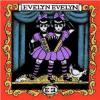Reviews by Natalie Ballard

Natalie Ballard has been writing for Elevate Difference for just over a year. She also does freelance work in editing, proofreading, and occasional online social promotion of other writers. She has attended Flagler College in St. Augustine and University of South Florida in Tampa. Natalie is a long-time feminist activist, with a particular interest in the intersection of pop culture and feminism. To pay the bills, she proofreads legal notices for a Florida business newspaper.













